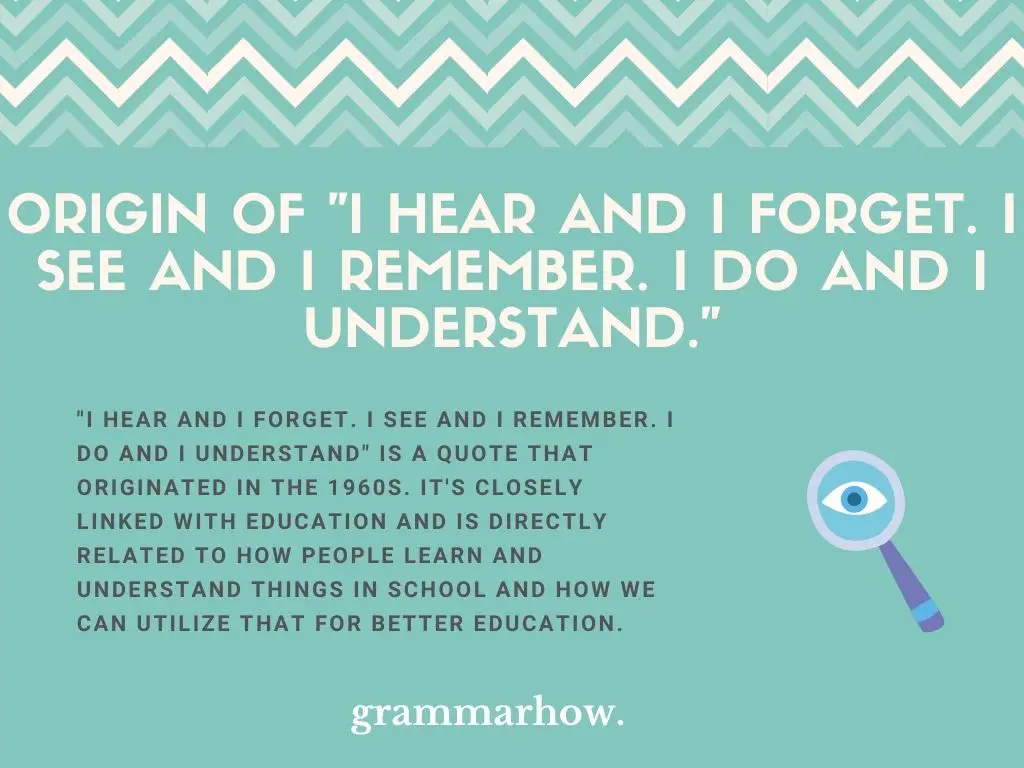The phrase “I hear and I forget. I see and I remember. I do and I understand” is commonly misattributed to Confucius. However, the origin of the phrase and the meaning are important to cover, and this article will look at answering that for you.
Origin Of “I Hear And I Forget. I See And I Remember. I Do And I Understand.”
“I hear and I forget. I see and I remember. I do and I understand” is a quote that originated in the 1960s. It’s closely linked with education and is directly related to how people learn and understand things in school and how we can utilize that for better education.

Many people seem to think Confucius, a Chinese philosopher, originally uttered the phrase, but this is entirely incorrect. It wasn’t until the 60s that this saying came to be, and many people now just associate it with him to try and stress the power and impact behind it.
Unesco Institute For Education, 1967
In this publication, it’s mentioned that “I hear and I forget,” and the rest of the saying is an old Chinese proverb. However, they do not mention anything about Confucius.
Instead, this book simply talks about the power of doing an activity to fully understand it. It’s the most successful way for many people to learn.
Mathematics: Strategies of Teaching, 1968
In this book, we learn about the sensory development of the brain and how well it responds to certain stimuli and learning methods. They also draw attention to the Chinese proverb without mentioning Confucius by name.
Both this book and the Unesco publication in 1967 likely saw an old Chinese proverb written by Xunzi (a supporter of Confucius). From there, other people took the words “Chinese proverb” and associated them with Confucius, even if that was incorrect.
Meaning Of “I Hear And I Forget. I See And I Remember. I Do And I Understand.”
The phrase means that if we simply “hear” information, we’ll forget it. If we go further and “see” (i.e., study from a book), we will remember it but not grasp it. If we “do” the thing and remember the activity, we will completely understand what we’re learning.
It’s closely linked with educational capability. Many people have a much easier time learning when they act on what they’re learning. It’s common if a child isn’t understanding something for a teacher to get them to stand up and actually take a physical role in the lesson.
From there, it’s likely that their brains will have an easier time understanding what the teacher is trying to convey. It’s easiest to learn when we can associate something that we did in the past with what we’re learning about.
When is the phrase used?
As we’ve mentioned, the phrase is most common in educational sectors. You’ll most likely hear it in schools when teachers are trying to encourage their students to learn in appropriate and successful ways.
The phrase talks about how easy it is to understand and learn something when you put the time into “doing” it. If you simply study from a book, you’ll never fully understand it. That’s why it’s used mostly in schools or colleges.
We can still attribute this phrase today, even if it was an old Chinese proverb by Xunzi thousands of years ago. The wisdom provided by the simplicity of the saying is most of the reason why it’s still a large part of today’s education system.
Of course, our schools have a lot to learn about it still. It’s important to encourage children to understand something rather than simply listen to or read about it.
Other Confucius Quotes
We thought it best to finish this article by sharing a few other Confucius quotes with you. While this one wasn’t specifically written by him, he’s still famous for some of the following:
- “Everything has beauty, but not everyone sees it.”
- “To see what is right, and not to do it, is want of courage or of principle.”
- “Wheresoever you go, go with all your heart.”
- “A superior man is modest in his speech but exceeds in his actions.”
- “If you look into your own heart, and you find nothing wrong there, what is there to worry about? What is there to fear?”
